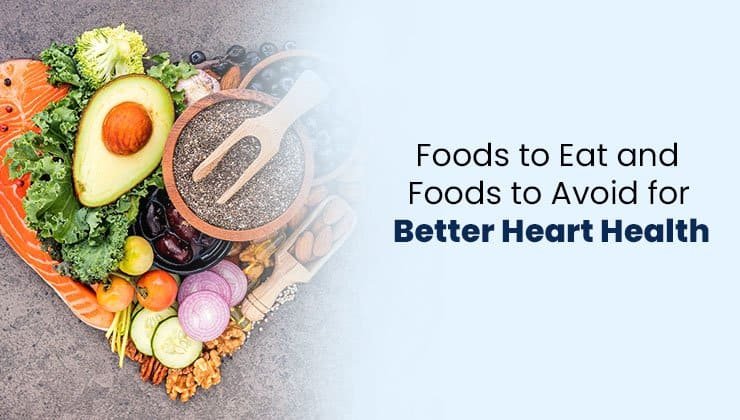Heart disease remains the leading cause of death worldwide, and diet has been shown to play an important role in its prevention. Adopting a heart-healthy diet pattern may significantly reduce the risk of developing heart disease and related complications.
Read on to discover which foods support heart health and which ones to avoid to help protect the heart and improve your overall well-being!
Understanding Heart-Healthy Foods
Heart-healthy foods are those that can significantly enhance your cardiovascular health by improving blood flow, reducing inflammation, and lowering cholesterol levels. Along with regular physical activity, maintaining a healthy body weight through nutritious eating is essential for protecting your heart.
The different dietary tips to help with heart health include
- Consume different fruits and vegetables
- Choose whole grains instead of refined grains
- Limit added sugars and sodium-rich foods
- Incorporate healthy sources of protein, including lean meats, seafood, or plant-based proteins.
- Moderate alcohol consumption
- Minimize processed foods
- Practice portion control to avoid overeating
Foods To Eat For Heart Health
Heart-healthy foods, when incorporated consistently, may significantly reduce the risk of cardiovascular disease. Here are a few foods to eat for heart health:
Fruits And Vegetables
Fruits and vegetables play an important role in heart health as they are rich in antioxidants. It is beneficial to incorporate a variety of colourful vegetables in your diet, including tomatoes, peppers, edamame, beets, and carrots, to ensure a wide range of nutrients.
Leafy greens, including kale, spinach, and bok choy, are nutrient-dense and have been shown to lower blood pressure and reduce the risk of heart diseases. Fresh fruits are also packed with antioxidants and help in reducing inflammation.
While choosing canned vegetables or fruits, opt for varieties low in sodium and without any added sugars to maintain their heart-healthy benefits.
Whole Grains
Whole grains are a rich source of dietary fibre that helps maintain cholesterol levels and thereby reduces the risk of heart disease. It is recommended to replace refined grains with whole grains to reduce the risk of developing coronary heart disease.
You may incorporate whole-grain bread, bagels, pasta, couscous, whole-grain hot or cold breakfast cereals, and brown rice, quinoa, and oats in the diet.
Healthy Low-fat Proteins
Plant-based proteins, nuts, and fish are associated with reduced risk of cardiovascular disease. Legumes, including beans, lentils, and chickpeas, are rich in fibre, proteins, and antioxidants. They help in promoting heart health by reducing cholesterol levels and improving blood pressure
Nuts may also contribute to a decreased risk of cardiovascular disease by offering fibre, polyunsaturated fats, and proteins. Fatty fish, including salmon, mackerel, and sardines, are rich in omega-3 fatty acids and are known to reduce inflammation and support overall cardiovascular health.
Additionally, when choosing animal proteins, opt for lean meats, including ground beef, pork tenderloin, or skinless chicken, to minimise the cardiovascular risks.
Low-fat Dairy
It is recommended to replace full-fat dairy products with low-fat dairy products. It includes low-fat or fat-free milk, yoghurt, cottage cheese, and fortified soy beverages.
It provides calcium and protein without the added saturated fats found in full-fat versions and helps to support bone and heart health.
Unsaturated Fats
Saturated fats in the diet are associated with a higher risk of cardiovascular disease. It is preferable to replace saturated fats in the diet with healthier unsaturated fats. Unsaturated fats are found in seafood, nuts, seeds, avocados, and oils.
Healthier oils, including soybean, corn, safflower, and sunflower oils, are high in monounsaturated and polyunsaturated fats, which are good for heart health.
Avocado is abundant in healthy fats, fibre, and micronutrients that are associated with cardiovascular health.
Read Also: Foods to Eat and Avoid After Angioplasty | Heart Diet Tips
Foods To Avoid For Heart Health
There are certain foods, including foods with high levels of sodium, saturated fats, added sugars, and alcohol, that should be avoided to protect heart health.
Saturated and Trans Fat
Saturated fats, found in red meat, butter, and full-fat dairy products, may raise cholesterol levels, which lead to the buildup of plaque in the arteries. It may, in turn, raise the risk of heart attack and stroke.
Excessive Sodium
Excessive sodium is found in salty foods, including table salt, processed foods, chips, pizza, and frozen foods. It may lead to high blood pressure, which is a major risk factor for heart disease. Processed meats, including bacon, beef jerky, and red meat, are also rich in sodium.
Added Sugars
Diets high in added sugars, especially from sugary beverages, sweets, and processed snacks, may lead to increased triglycerides, weight gain, and higher blood pressure. It may elevate the risk of heart disease.
Refined Carbohydrates
Refined carbohydrates, including white bread, pastries, and pizza, may cause rapid spikes in blood sugar and insulin levels. Over time, it may lead to an increased risk of heart disease. Choosing whole grains and fibre-rich foods may help maintain blood sugar levels.
Read Also: Foods to Eat & Avoid After Coronary Bypass Surgery
Sample 7-day Indian Heart-Healthy Diet Plan
Here is a sample 7-day Indian heart-healthy diet plan emphasising whole grains, fruits, vegetables, lean proteins, healthy fats, and minimal salt and sugar.
| Day | Breakfast | Lunch | Evening snack | Dinner |
| Day 1 | Oats porridge with a handful of almonds | Brwon rice + moong dal + vegetables + salad | Roasted channa + green tea | Multigrain roti + vegetable curry + low-fat yoghurt |
| Day 2 | Vegetable upma + a glass of buttermilk | Quinoa pulao with peas, tofu + cucumber raita | Apple | Whole wheat roti + masoor dal + bottle gourd sabzi |
| Day 3 | Poha with vegetables + flaxseed powder | Ragi roti + palak dal + carrot-beet salad | Guava | Bajra khichdi + vegetable sabzi + chutney |
| Day 4 | Smoothie with spinach, banana and chia seeds | Brown rice + chana dal + vegetable sabzi | Roasted foxnuts | Whole wheat pasta + salad |
| Day 5 | Moong chilla with mint chutney | Whole wheat roti + rajma curry + salad | A handful of mixed seeds | Vegetable dahlia + sautéed spinach |
| Day 6 | Vegetable paratha + low-fat curd | Bajra roti + dal + mixed vegetable sabzi | Boiled corn with lime | Oats khichdi |
| Day 7 | Idli with sambhar with coconut chutney | Whole wheat phulka + stir-fried green beans | Unsweetened lassi + orange | Multigrain bread + vegetable stew |
Table: Sample 7-day Indian Heart-Healthy Diet plan
Heart-Healthy Diets
Some of the popular diets that help in promoting heart health are
- DASH (Dietary Approaches to Stop Hypertension) Diet: It primarily focuses on eating plenty of fresh fruits, vegetables, lean proteins, low-fat dairy, beans, nuts, and vegetable oils. It emphasises limiting sweets and foods high in saturated fats.
- Mediterranean diet: It is a plant-based diet focusing on vegetables, fruits, whole grains, beans, legumes, low-fat dairy products, fish, poultry, vegetable oils, and nuts. It limits added sugars, sugary beverages, sodium, highly processed foods, saturated fats, and processed meats.
- Plant-based diets: Diets high in vegetables, fruits, beans, nuts, and seeds are associated with improved heart health. However, plant-based diets high in refined grains, sugary beverages, and highly processed snacks may still increase the risk of heart disease.
Conclusion
Following a heart-healthy diet rich in nutrient-dense foods, including fruits, vegetables, whole grains, healthy fats, and lean proteins, may help lower the risk of cardiovascular diseases. Limiting unhealthy fats, sodium, and added sugars may help to maintain a strong and healthy heart.
If you have questions regarding heart health and nutrition, you may contact Dr Nikhil of Heart360 Care for personalised guidance!
Frequently Asked Questions
Yes, minimally invasive heart surgery can be more expensive than traditional open-heart surgery due to thThe best diet for the heart includes a variety of fruits and vegetables, whole grains, lean proteins, low-fat dairy, and healthy fats. Limit saturated and trans fats, added sugars, and refined carbohydrates. Many scientists recommend diets, including Mediterranean and DASH as they are lower in sodium, saturated fat, and added sugars.
Caffeine is rich in coffee, tea, chocolate, and energy drinks. Moderate coffee consumption is generally considered safe for most individuals and may offer some heart health benefits. However, excessive caffeine intake may lead to increased heart rate and blood pressure. It is preferable to check with your healthcare professional whether caffeine is safe for you.
Not all fats are harmful and bad for the heart. Unsaturated fats in olive oil, avocados, and nuts may be beneficial for heart health when consumed in moderation. It is important to limit saturated and trans fats that may raise bad cholesterol levels.
It is not necessary to eliminate all sugars, but it is important to limit added sugars found in processed foods and beverages. Excessive sugar intake may contribute to weight gain, high blood pressure and increased risk of heart disease.









